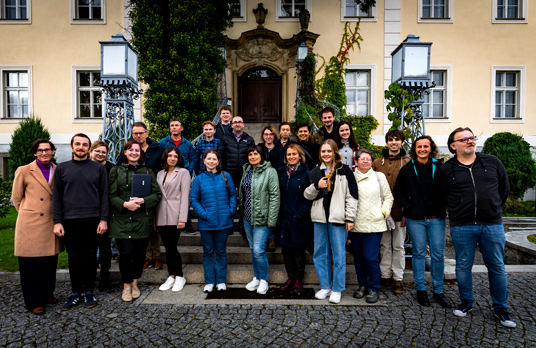Diese Website verwendet verschiedene Cookies. Wir verwenden Cookies, um Inhalte zu personalisieren, Funktionen für soziale Medien bereitzustellen und die Zugriffe auf unsere Website zu analysieren. Einige Cookies, die auf unseren Seiten erscheinen, werden von Dritten platziert. Weitere Informationen und Auswahlmöglichkeiten finden Sie in unserer Datenschutzerklärung und in den Nutzungskonfigurationen.
Autumn School in Krzyżowa

On 19-23 September 2021, a unique meeting took place as part of the project “Teaching History: See, Acknowledge & Respect” organised by the Confronting Memories programme of CSF e.V. Around 20 teachers and non-formal educators from five countries – Germany, Poland, Belarus, Russia and Ukraine – met in Krzyżowa, Poland, for an Autumn School.
Until this meeting, the project consisted of a series of webinars, during which the participants, in international groups, worked together to create lesson materials about WWII. The brief: how can we teach the war from multiple perspectives, and not just the perspective usually shown in these countries? This was often easier said than done: not only is the subject of the war treated differently in these countries, but also teaching methodologies differ. What may be an acceptable method of teaching in Hannover is not the same as in Novosibirsk, for example, and vice versa. Nevertheless, the participants were able to work together successfully and produce two lesson plans about the depictions of the war in art and film, and two plans about population displacement as a result of the war. These materials will supplement the materials made in 2020 as part of the same project, and will soon be made available on confronting-memories.org.
The Autumn School was not only about work: an exciting programme included trips to the Church of Peace in nearby Świdnica, the Gross-Rosen concentration camp, a tour around Wrocław, as well as a visit to the Depot History Center in Wrocław. We were also given a tour of the Krzyżowa estate and listened to a talk about the post-war history of Wrocław.
Our choice of venue at the Krzyżowa Foundation for Mutual Understanding in Europe was a careful one. This area of Poland once belonged to Germany, and Krzyżowa was the site of the German-Polish reconciliation mass in 1989, an important moment in bilateral relations between the two countries. Furthermore, the Kreisauer Kreis, a resistance group active during WWII, met here in the early 1940s. These tangible links to the past were at once a stimulus to the history teachers while working on their lesson materials, and a reminder that meetings such as this one were not always possible.
It was an inspirational meeting for many reasons, not least because it was one of the first large in-person meetings since the outbreak of the Coronavirus pandemic for many of the participants. It was a meeting of like-minded individuals with similar professions but greatly different experiences in their day-to-day lives; ideas and experiences were shared and friendships were made.
As well as the creation of the lesson materials, interviews were also carried out with participants from Germany, Poland, Belarus, Russia and Ukraine, who shared their motivation to become history teachers and what the project meant to them. These interviews will shortly be posted on the Confronting Memories Facebook page, Twitter account, and the YouTube account of CSF e.V.
The project “Teaching History: See, Acknowledge & Respect” is implemented in cooperation with CSF members: The Jan Nowak-Jezioranski College of Eastern Europe and Youth Memorial Initiative Group, Perm as well as Insha Osvita, Kyiv and History Workshop Leonid Levin, Minsk. The project is kindly supported by the German MFA, the EU, Study Tours to Poland and Civil Society Cooperation.